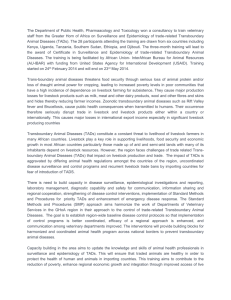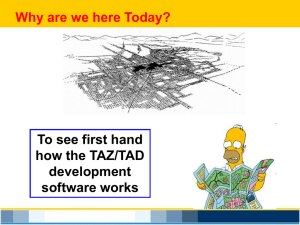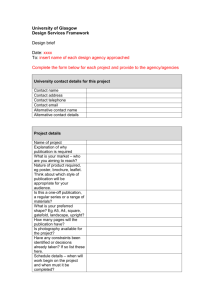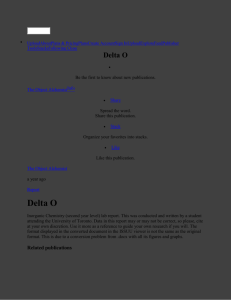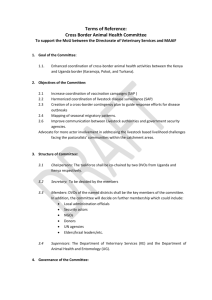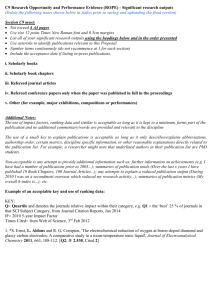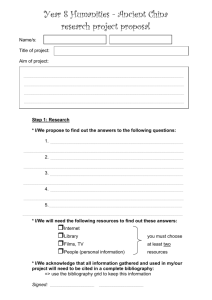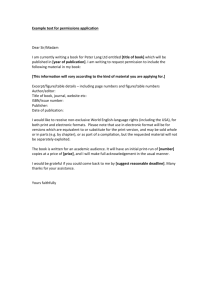Treatment of Adolescent Depression Study (TADS)
advertisement
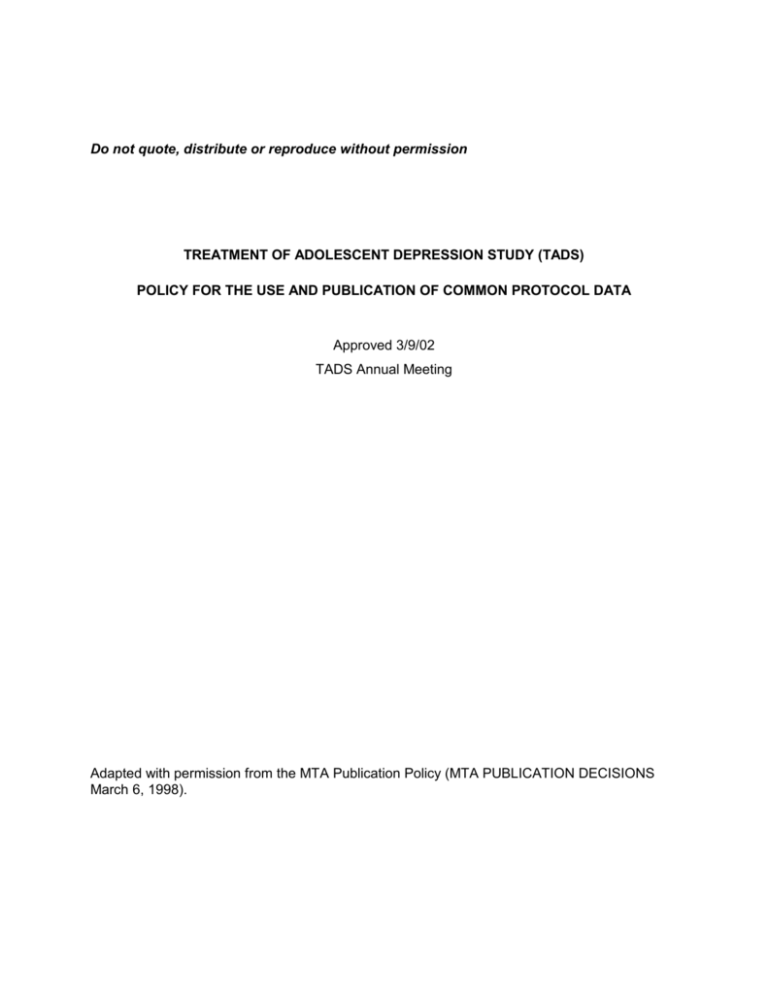
Do not quote, distribute or reproduce without permission TREATMENT OF ADOLESCENT DEPRESSION STUDY (TADS) POLICY FOR THE USE AND PUBLICATION OF COMMON PROTOCOL DATA Approved 3/9/02 TADS Annual Meeting Adapted with permission from the MTA Publication Policy (MTA PUBLICATION DECISIONS March 6, 1998). A. Terms Used in This Policy; Definitions 1. "Study phase" refers to data collected for each subject in the original Treatment of Adolescent Depression Study (TADS), funded by NIMH Contract issued under RFP-NIH-NIMH 98-DS0008. 2. For the purposes of this policy, the term "site" refers to the twelve groups of collaborating TADS scientists: as follows: Carolinas Medical Center: Charles Casat; Case Western Reserve University: Norah Feeney; Columbia University at NYSPI: Bruce Waslick; Johns Hopkins University: John Walkup; University of Nebraska: Chris Kratochvil; New York University: Anne Marie Albano; Northwestern University: Mark Reinecke; University of Cincinnati: Floyd Sallee; University of Oregon: Paul Rohde, Anne Simmons; University of Pennsylvania: Elizabeth Weller; University of Texas, Southwestern: Graham Emslie; Wayne State University, David Rosenberg. Greg Clarke, PhD, (University of Oregon) and David Brent (WPIC) are consultants. Gary Koch, Ph.D. (University of North Carolina) is statistical consultant. 3. The term "TADS Publication Committee" refers to the PI of each existing TADS site, designated Coordinating Center staff, designated NIMH staff and a nonvoting statistical consultant. For the purposes of implementing this policy after the termination of TADS funding, the same TADS Publication Committee (with appropriate changes of membership as provided below) will remain in existence until all TADS data are made available for public use, as stated in Point B5 of this policy. As PI of the TADS trial, Dr. March is also Chair of the Publications Committee. Except where otherwise stipulated, decisions are by a simple majority, with each site, the CC and the NIMH having one vote. In the rare event of a tie, Dr. March representing the Coordinating Center may cast a second vote. A quorum is defined at least 7 field sites plus the CC and the NIMH. The Publication Committee will meet as needed, depending on the phase of the trial. 4. The "TADS Team" list of collaborators for acknowledgement and authorship purposes is developed from the Publications Committee as defined above. When referring to standard text for insertion into manuscript acknowledgements, the TADS Team membership is sometimes called "boilerplate.” The TADS boilerplate by study phase, which is listed in Section G of this document, serves as: A standard acknowledgement list for all publications arising from TADS; A de facto author list (in acknowledgement form) for papers officially authored by "The TADS Team" (e.g., core outcome papers). Of the four boilerplate authors, one must be the PI; one must be an MD responsible for Pharmacotherapy supervision; one must be a PhD or MD responsible for CBT supervision. With the exception of Co-I numbers 1-3, who serve at the discretion of the site PI, the overall format of the TADS boilerplate (CC, NIMH, sites, consultants) can be changed only by a majority vote of the Publications Committee with approval by the CC PI, Dr. March. At any given time, membership in the TADS Team boilerplate may vary, depending on the different phases of the study (Stages I to IV and, if funded, follow-up), and may be modified/tailored for a specific paper. Note that, although 3 Co-Investigators are the maximum, 2 or 3 are acceptable at site PI option. 5. The terms "publication" and "paper" refer to written publications in journals and books. "Core paper" refers to the primary, major, flagship papers, including: 1) methods papers ("core methods papers") and 2) the data papers reporting tests of the primary hypotheses, including secondary analyses directly relevant to understanding the outcomes and their processes --i.e., major moderators and mediators ("Core Outcome papers"). Papers other than core papers are non-core or "Secondary Papers" and are expected to constitute the majority of papers resulting from the TADS. Secondary papers in this sense must be distinguished from secondary analyses for primary papers. 6. The term presentation involves use of common-protocol data at meetings for the purposes of an oral presentation (with or without slides or other handouts) or a poster. Such presentations may or may not include a published abstract or press reports. 7. The term add-on refers to studies approved within the framework of the TADS add-on policy that use but are not limited to common protocol data. 8. This document also defines the TADS policy regarding the use of common protocol data or other TADS materials in grant applications, including NIH, NSF or other Federal or nonFederal applications for funding that might use TADS data or materials. B. Publication Policy for Core Papers 1. Core paper(s) will be published at baseline, 12 weeks, 36 weeks and follow-up. 2. Core papers will be authored by the TADS Team using boilerplate authorship acknowledgement. 3. Changes to the boilerplate for a specific paper may be made by the TADS Publication Committee for the 2 categories of core papers as follows: a. Authorship of core outcome papers is restricted to the TADS Team (See appendix for lists for respective study phases). Official authorship will be "by the TADS Team" and the names listed in the acknowledgement, the so-called boilerplate. Addition of another collaborator to the acknowledgement requires a unanimous vote of the Publication Committee. Substitution or deletion requires a simple majority of the Publication Committee and approval by the site PI and the TADS PI. For a substitution, the person being displaced must be willing (it is assumed that a substitution is within the same site). The wording and placement of any additions for specific papers will be determined by the Publication Committee case-by-case. b. Given that all core papers will be written by the Coordinating Center, the corresponding author for all Core Papers will be Dr. March or his designee. c. Votes on additions, deletions, or substitutions from the boilerplate for core papers will be done either by secret ballot at face-to-face executive sessions, on specially-called executive session teleconferences, or by executive e-mail (confidential e-mail ballots to the executive secretary), and only positive results will be recorded. C. Publication Policy for Non-Core Papers 1. Procedures for analyzing and publishing common-protocol data on any secondary topic (noncore papers) are as follows: a. To promote collegiality, improve efficiency and to unify publication tracking, paper proposals for non-core papers must be approved, first, by the site PI and, then, by Dr. March prior to initiating the procedures below. This step is administrative and is not intended to represent a scientific judgment regarding the quality of a paper proposal or the eventual appropriateness of authorship both of which well be determined by the Publications Committee as outlined below. b. No publication utilizing baseline data or comparing or contrasting treatment groups on any measure will be published before the major, primary, outcome paper(s) at baseline, 12 weeks, 36 weeks and follow-up. c. The document, "Papers from TADS Collaboration Based on Common-Protocol Data" will constitute the list of publications. The Coordinating Center will periodically update the paper list and circulate it to all sites. Common protocol data should not be used in any publication not listed in the most recent version of the "Papers from TADS Collaboration Based on CommonProtocol Data" until the data set is released for public use. d. Any collaborating scientist sponsored by a PI, the CC or NIMH may propose a TADS paper. When an individual wishes to add a new paper to "Papers from TADS Collaboration Based on Combined Data," the individual who wishes to be lead author (or his/her PI or NIMH equivalent) will circulate a description of the paper inviting participation by authors from each of the other sites. Being the first person to request to take the lead on a paper does not guarantee first authorship. e. Once past approval for submission by the site PI and Dr. March, authorship of papers is supervised by the TADS Publication Committee who will determine if two or more persons or sites wish to take the lead on an article, or if anyone feels that two suggested topics overlap too much to be separate papers, the first attempt at resolving the differences should be made by the persons involved. The committee or proposing authors ideally will chose to deal proactively with authorship matters by contacting all potential authors of each paper to settle emergent differences. If a mutually satisfactory agreement cannot be negotiated, the dispute will be settled by majority vote of the Publications Committee. f. No one should be listed as an author of any publication who does not play a substantive role in the conceptualization, interpretation, and/or execution of the data analyses and/or the writing of the manuscript. By virtue of their involvement in the trial, persons who are listed on the TADS boilerplate at a specific stage of publication are assumed to have met this provision. For other papers, all authors originally listed and expressing interest should be given an equal opportunity to participate and provide input. g. The lead author will take responsibility for working out an order of authorship that is satisfactory to all persons who ask to be authors according to the guidelines of this policy. Any disputes regarding number or authors or order of authorship will be settled by majority vote of the Publications Committee. h. Sites with an author taking the lead on an article may have more than one author from that site, depending on their contributions. Ordinarily, each paper based on common-protocol data will have a minimum of one author from each of the sites not taking the lead role on the paper. However, sites have the option of not nominating an author for any given paper.When contributions from more than one author from any site are useful, there may be more than one author from any site. i. Authors who are not in the TADS core group (e.g., other co-investigators, consultants, other faculty, research fellows, and other appropriate persons) may be lead or secondary authors of non-core publications of TADS data if (1) they play a key role in the conceptualization, data analysis, and writing of the paper, (2) the topic does not conflict with that of a paper that a member of the core group wishes to write, and (4) there is no objection by any of the other sites when the abstract and suggested authorship are circulated. Such persons may, at the site option, serve as the official site co-author on papers proposed and led by another site. j. Once a paper and its authorship have been approved according to the guidelines in this policy, the lead author will have 4 months to circulate a first draft of the manuscript. If this is not done, other collaborating TADS scientists may request to take the lead authorship according to the guidelines in this policy. D. Other Considerations 1. All non-core papers will include the TADS boilerplate as an acknowledgement. 2. The TADS data set for each major outcome phase (baseline, 12 week, 36 week and follow-up) will be released for public use by NIMH within three years from the official completion of the database (when the database is locked and made available for statistical analyses) . At that time, all scientists, including TADS collaborators, will have the same access to the data. For purposes of appropriate credit, the Publication Committee will designate a “boilerplate” listing of the TADS Team to be released with each data set, with the proviso that this list be published in the acknowledgements section of all papers emanating from that data set. This list may vary for different data releases in recognition of the contributions made by different collaborators in different phases (see Appendix). 3. If there is a dispute concerning any issue regarding publication of TADS data that cannot be satisfactorily resolved according to other provisions of this policy, the dispute will be settled by majority vote of the TADS Publication Committee, using the established voting procedure in the by-laws of that committee, subject to approval by the CC and the NIMH. Data use situations not covered explicitly by this policy or by the TADS Publication Policy will be similarly resolved. 4. Rules for use of common protocol data in add-on studies are defined in the add-on policy. The only restriction on publications based primarily on "add-on" data (e.g. that are considered to be “common protocol data”) from one's own site is that no publication comparing or contrasting treatment groups on any measure may be published before the major, primary papers or any relevant secondary or non-core paper. A description of any add-on study publications should be circulated to all sites, including NIMH, as a courtesy. Where more than one site participates in an "add-on", the lead author for the main paper from that add-on will be from the proposing site and each cooperating site may supply a co-author. The lead author may choose additional coauthors from any site, including those that did not participate. If an add-on paper includes analysis of common protocol data, it must go through the same approval procedures as other papers using common protocol data. Use of sex and age from the common data set does not require approval as long as no other common-protocol data are used. 5. In a spirit of collegiality, all TADS collaborating scientists are encouraged to keep the others informed of any use they make of TADS-associated data. E. Chapter and Scientific Presentation Policy. Chapters and scientific meeting presentations (with or without slides, handouts or a published abstract) by TADS collaborators referring to the TADS are governed by the following policy, meant to be complementary to the TADS Publication Policy for core and non-core data papers. 1. If a chapter or presentation only refers in a general way to the existence of the TADS and its general objectives or only summarizes with appropriate citation what is already published or in press with Publication Committee approval, no review or clearance is needed by the Publication Committee, although collaborators may wish to share chapters or abstracts as a collegial courtesy. 2. No data citation comparing or contrasting treatment groups on any measure will be done before the major outcome papers related to the respective timepoint are published. 3. If the chapter or presentation involves use of unpublished common-protocol data, the following guidelines apply: No unpublished data may be included unless they have been approved by the Publication Committee for a paper with the author/presenter as lead author (in which case the approved co-authors would presumably be co-authors of the chapter or abstract). The standard core paper references and "boilerplate" credit to the TADS Team should be cited. The relevant parts of the chapter or presentation must be circulated to the Publication Committee, which will review them and approve or disapprove at the next convenient teleconference or meeting. 4. Paragraph B. above notwithstanding, anything already presented as an official TADS presentation can without further approval be re-presented by individual collaborators of the TADS Team, using the same slides and maintaining the same balance as in the original presentation. This does not imply permission for use of such material in a chapter without specific Publication Committee approval. F. Policy for the Non-publication Use of Data from TADS This document also defines the TADS policy regarding the use of common protocol data or other TADS materials in grant applications, including NIH, NSF or other Federal or non-Federal applications for funding that might use TADS data or materials 1. No data citation comparing or contrasting treatment groups on any measure will be done before the major outcome papers related to the respective timepoint are “in press” or published. 2. Any collaborating TADS scientist nominated by a site PI and approved by Dr. March may request TADS Publication Committee approval to use the common-protocol TADS data as the basis for a grant proposal for secondary data analyses that are not similar to any paper listed with another collaborator as lead author in the most recent version of "Papers from TADS Collaboration Based on Common-Protocol Data." Approval will require majority vote. 3. With approval of the site PI and Dr. March, persons who are not TADS collaborating scientists (e.g., junior faculty, research fellows, graduate students, and other appropriate persons) may request permission to submit a grant proposal to seek funding for secondary analyses of TADS data if (1) sponsored to the TADS Publication Committee by one of the PIs, the CC or NIMH, (2) they are collaborating with or supervised by one of the TADS collaborating scientists in the proposed analysis, and (3) they circulate a brief description of the grant proposal to all sites. 4. TADS data that have been released for public use by NIMH will be available to all TADS collaborating scientists on the same basis as to the general scientific public. Each resulting paper must acknowledge the TADS Team boilerplate released with the respective data. G. TADS Team Lists (Boilerplate) by Study Phase 1. TADS TEAM FOR METHODS PAPERS Per 12/15/00 vote of the publications committee, the boilerplate is as follows: Members of the Treatment of Adolescent Depression Study (TADS) Team are the authors of this report. TADS is coordinated by the Duke Clinical Research Institute and the Department of Psychiatry at Duke University Medical Center in collaboration with the National Institute of Mental Health (NIMH), Rockville, Maryland. The Coordinating Center principal collaborators are John S. March, Steven Petrycki, Susan Silva, John Curry, Karen Wells, John A. Fairbank, Barbara Burns, and Marisa Domino. The NIMH principal collaborators are Benedetto Vitiello and Joanne B. Severe. Principal Investigators and Co-investigators Co-I #1, Co-I #2, Co-I # 3 from the twelve sites are as follows: Carolinas Medical Center: Charles Casat; Case Western Reserve University: Norah Feeney; Columbia University at NYSPI: Bruce Waslick; Johns Hopkins University: John Walkup; University of Nebraska: Chris Kratochvil; New York University: Anne Marie Albano; Northwestern University: Mark Reinecke; University of Cincinnati: Floyd Sallee; University of Oregon: Paul Rohde, Anne Simmons; University of Pennsylvania: Elizabeth Weller; University of Texas, Southwestern: Graham Emslie; Wayne State University, David Rosenberg. Greg Clarke (University of Oregon) and David Brent (University of Pittsburgh) are consultants. Gary Koch (University of North Carolina) is statistical consultant. 2. TADS TEAM FOR BASELINE To be determined 3. TADS TEAM FOR ACUTE (12 Week) TREATMENT To be determined 4. TADS TEAM FOR LONG-TERM (36 Week) TREATMENT To be determined 5. TADS TEAM FOR LONG-TERM FOLLOW-UP To be determined
